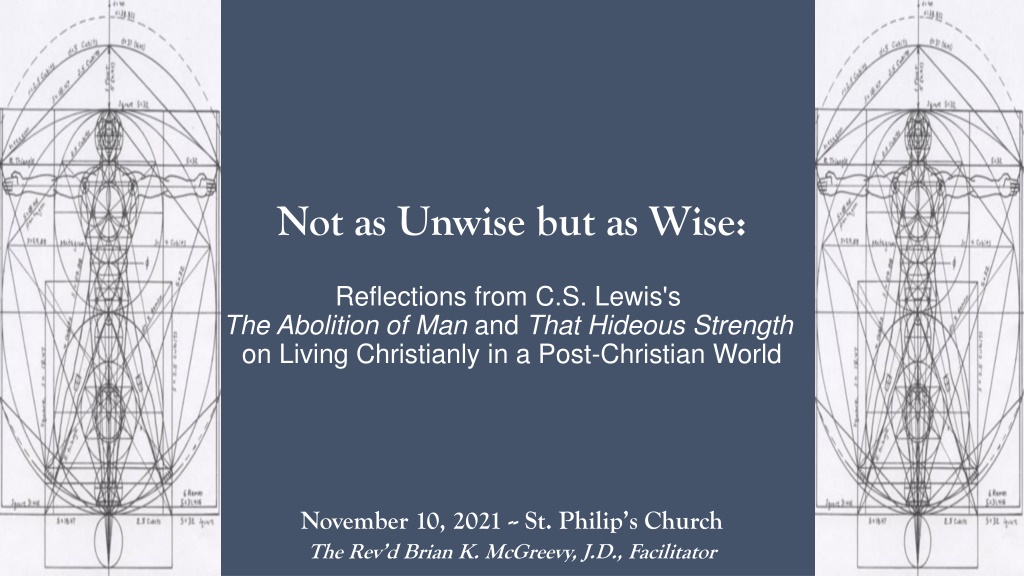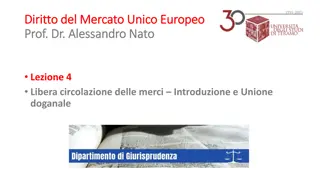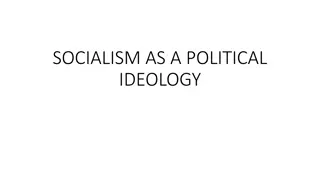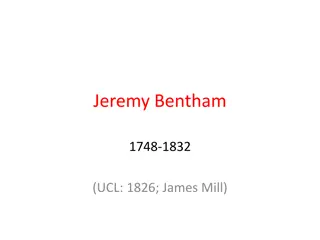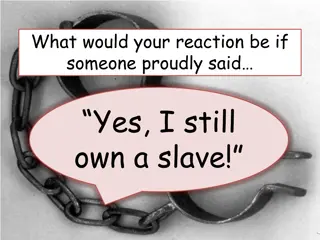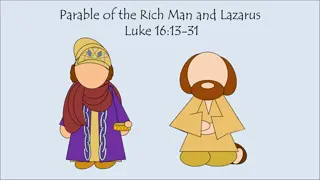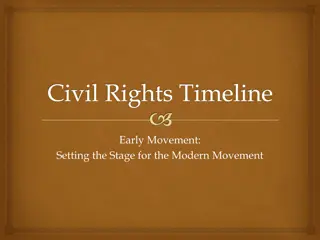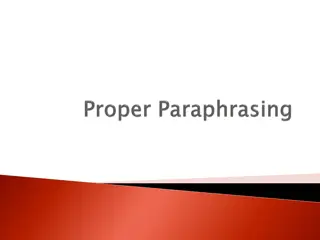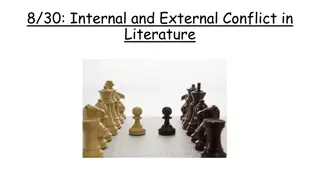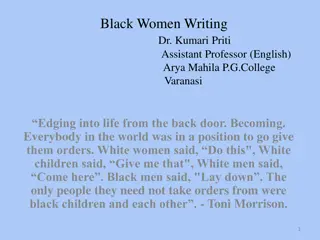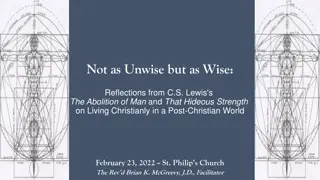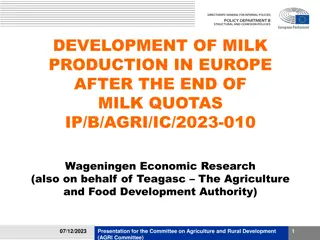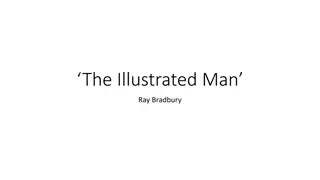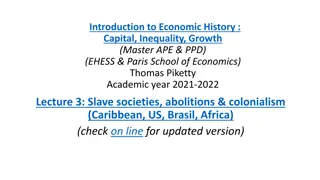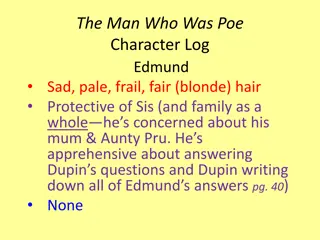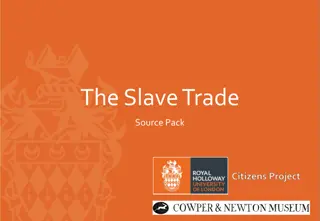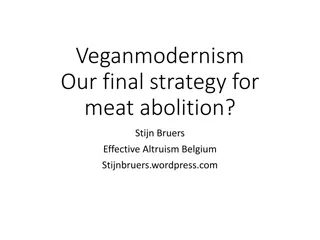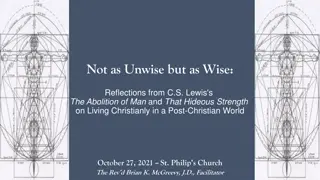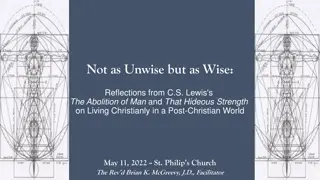Living Wisely in a Post-Christian World: Insights from C.S. Lewis
Reflect on the teachings of C.S. Lewis in "The Abolition of Man" and "That Hideous Strength" to navigate living as a Christian in today's secular society. Explore themes of light versus darkness, wisdom, and uncovering truth through guided discussions and weekly reflections.
Download Presentation

Please find below an Image/Link to download the presentation.
The content on the website is provided AS IS for your information and personal use only. It may not be sold, licensed, or shared on other websites without obtaining consent from the author. Download presentation by click this link. If you encounter any issues during the download, it is possible that the publisher has removed the file from their server.
E N D
Presentation Transcript
Not as Unwise but as Wise: Reflections from C.S. Lewis's The Abolition of Man and That Hideous Strength on Living Christianly in a Post-Christian World November 10, 2021 -- St. Philip s Church The Rev d Brian K. McGreevy, J.D., Facilitator
For at one time you were darkness, but now you are light in the Lord. Walk as children of light (for the fruit of light is found in all that is good and right and true), and try to discern what is pleasing to the Lord. Take no part in the unfruitful works of darkness, but instead expose them. For it is shameful even to speak of the things that they do in secret. But when anything is exposed by the light, it becomes visible, for anything that becomes visible is light. Therefore it says, Awake, O sleeper, and arise from the dead, and Christ will shine on you. Look carefully then how you walk, not as unwise but as wise, making the best use of the time, because the days are evil. Therefore do not be foolish, but understand what the will of the Lord is. Ephesians 5: 8-17
How to approach this class: --On the beach --Snorkeling --Scuba diving --Email list How to read The Abolition of Man: --Why it s not an easy read original audience and the premises of Natural Law --Try reading aloud --One paragraph at a time What we ll be doing each week: --Examining context and establishing a framework for appreciating these books --Unpacking the meaning of Lewis s works --Exploring their relevance for today --Considering how we can respond with practices of Hope and of Wisdom rooted in the Scriptures
Review from previous classes: I. How did C.S. Lewis come to write these two books, what was the context, and how are these two books connected? --C.S. Lewis and how his background prepared him for writing these books: converted atheist, philosopher II. Education and its fundamental importance for how we view the world --Liberal Arts--St. Augustine: wrote that part of the answer to the despair of skepticism is found in the Christian conviction that Truth is attainable and that knowledge and wisdom are possible, because all Truth derives from God in His creation and His Law, perfectly revealed in Jesus Christ. In City of God, Augustine defined virtue as rightly ordered love. Universities and the Liberal Arts Education, and particularly higher education, was part and parcel of the mission of the Church from its earliest days. Universities were unknown in the ancient world and only came into being because the Church started them. What we think of as the great universities like Oxford and Harvard were robustly Christian in their original mission statements. Whatever Happened to Philosophy? Philosophy was considered THE most important part of education, and was invariably a required part of university studies answering these questions was the real WHY people went to college. However, over the past 50 years the study of philosophy has shrunk, first being subsumed into a required Western Civilization course, then made optional, and then disdained as IMPRACTICAL (won t help you get a job), politically incorrect, and harmful (Patriarchy of Dead White Men). So he sent the word to slay/And slew the little childer Surely it must have been a kind of macabre joke on Lewis s part to preface a critique of textbooks with these lines? But no: Herod could but kill the body; our teachers (Lewis thinks) are killing our children s souls, and this is the more grievous sin. Lewis scholar Alan Jacobs
CHAPTER 1: MEN WITHOUT CHESTS --Gaius, Titius, and The Green Book --Characteristics of Waterfalls and the Biblical Idea of Living Water-- They have forsaken me, the spring of living water, and have dug their own cisterns, cisterns that cannot hold water Jeremiah 2:13 Lewis believes that Beauty is a real, objective value which we can be taught to recognize and to love. Augustine s On Christian Doctrine:: Living a just and holy life requires one to be capable of an objective and impartial evaluation of things: to love things, that is to say, in the right order. --Trained emotions: Without the aid of trained emotions (learning to love what is True, Beautiful, and Good), the intellect or mind which knows what to do is powerless against the animal organism. Only as the Chest, the seat of emotions and sentiments, is rightly trained to respond in accordance with objective moral values, will it be able to control the appetites of the Belly. --Eustace Scrubb, Experiment House, and education: Eustace had read all the wrong books! --Another Lens: The Abolition of Man s argument as expressed in Mere Christianity: Right and wrong are clues to the meaning of the universe because of the Law of Human Nature. Friedrich Wilhelm Nietzsche (1844-1900) German philosopher who is known as the father of Nihilism. Nihilism is the belief that all values are baseless and that nothing can be known or communicated. Jacques Derrida (1930-2004)French philosopher influenced by Nietzsche, known for his theory of Deconstruction. The idea of a fixed centre of Absolute Truth was only a structure of power imposed on us by our past or by institutions of society, but in reality such a fixed centre does not exist at all. Therefore we must stop considering everything in life, culture and thought in relation to absolute truth, because to do so is oppressive and immoral. Michel Foucault (1926-1984) French public intellectual Claims to knowledge advance the interests and power of certain groups while marginalising others. There are no moral facts whatever. The Self is no longer considered as passively conforming to external realities, but as the active agent of its own creation.
Note that later in the 20th century Derrida and Foucault write and argue for exactly the positions that Lewis anticipates in The Abolition of Man, which was written in 1943, decades before Derrida and Foucault became known. Through their theories, Derrida and Foucault have transformed virtually every discipline in the academic world, fulfilling Lewis s prophecies.Through its vehement opposition to logocentrism (the belief that there is a realm of truth that exists prior to and independently of its representation by linguistic and other signs), Deconstructionism robs the world of meaning and wonder. CHAPTER 2: THE WAY --Not No Values but Whose Values? The practical result of education in the spirit of The Green Book must be the destruction of the society which accepts it because of the elimination of Objective Value. --The Innovator It is impossible to innovate morality without referencing a should or ought rooted in the Tao. --Argument from Instinct A fatal flaw of this argument is why should we follow a particular instinct, and if we are dealing with conflicting instincts, how can we choose among them without a should or ought rooted in the Tao. --Bootstrapping: All the values Innovators use in attacking the Tao, and even claims to be substituting for it, are themselves derived from the Tao. Conclusions: This thing which I have called for convenience the Tao, and which others may call Natural Law or Traditional Morality or the First Principles of Practical Reason or the First Platitudes, is not one among a series of possible systems of value. It is the sole source of all value judgements. If it is rejected, all value is rejected. If any value is retained, it is retained. The effort to refute it and raise a new system of value in its place is self-contradictory. There has never been, and never will be, a radically new judgement of value in the history of the world. What purport to be new systems or (as they now call them) ideologies , all consist of fragments from the Tao itself, arbitrarily wrenched from their context in the whole and then swollen to madness in their isolation, yet still owing to the Tao and to it alone such validity as they possess. The rebellion of new ideologies against the Tao is a rebellion of the branches against the tree: if the rebels could succeed they would find that they had destroyed themselves.
The End: No Values at All: Let us regard all ideas of what we ought to do simply as an interesting psychological survival: let us step right out of all that and start doing what we like. Let us decide for ourselves what man is to be and make him into that: not on any ground of imagined value, but because we want him to be such. Having mastered our environment, let us now master ourselves and choose our own destiny This is a very possible position: and those who hold it cannot be accused of self-contradiction like the half-hearted sceptics who still hope to find real values when they have debunked the traditional ones. This is the rejection of the concept of value altogether. CHAPTER 3: THE ABOLITION OF MAN Summary adapted from Rev. Dr. Michael Ward in After Humanity --Following the Check-up in Ch. 1 and the Diagnosis in Ch. 2, we now have the Prognosis in this chapter. In closing the coffin lid on objective value, humanity has opened Pandora s box. We no longer find the solutions to the problems of life in knowledge self-discipline and virtue but increasingly in willpower, technological control, and surgical alteration of nature to suit our own convenience. --The effects of this development will be far worse on the vast majority of people, while elite minorities in politics, education, medicine, and related fields will hold positions of influence and will admit no moral constraints on their behavior. --These elite manipulators (Lewis calls them Conditioners ) have ceased to be Human by stepping completely outside the Tao. Self-conditioned to be morally blind, these formerly human beings will pass on their blindness to any children whom they raise and any pupils whom they educate. --"Lewis s argument has moved from cynics casually debunking Objective Value, to ideologues offering a hollow epistemological basis for moral judgments, to Nietzschean voluntarists asserting their will to power: The process which, if not checked, will abolish Man goes on apace among Communists and Democrats no less than among Fascists. The methods may (at first) differ in brutality. But many a mild-eyed scientist in pince-nez, many a popular dramatist, many an amateur philosopher in our midst, means in the long run just the same as the Nazi rulers of Germany: 'Traditional values are to be debunked' and mankind to be cut out into some fresh shape..
The grouping of Communism and Fascism with Democracy is telling. The malaise that Lewis would diagnose is not peculiar to totalitarian dictatorships and there is no room for complacency even in stable, tolerant, democratic England. Lewis implores his readers to remember that there are progressions in which the last step is incommensurable with the others. The [only] solution is dogmatic belief in objective value, for this is a belief necessary to the very idea of a rule which is not tyranny or an obedience which is not slavery Lewis could not be clearer about the peril he foresees nor about the antidote he prescribes. What is less clear is whether he sees any real hope that his cautions will be listened to and acted upon. Elements of Lewis s argument It came burning hot into my mind, whatever he said and however he flattered, when he got me home to his house, he would sell me for a slave. John Bunyan What does Man s power over Nature really mean? With the airplane, the wireless, and contraceptives, it means that you have to pay to have access to these things, which are under the control of other men. Any or all of these three things can be withheld from some men by other men by those who sell, or those who allow the sales, or those who own the sources of production, or those who make the goods. What we call Man s power is, in reality, a power possessed by some men which they may, or may not, allow other men to profit by. [For the airplane and the wireless,] Man is as much the patient or subject as the possessor, since he is the target both for bombs and for propaganda.[For contraceptives] all possible future generations are the patients or subjects of a power wielded by those already alive. [Thus,] what we call Man s power over Nature turns out to be a power exercised by some men over others with Nature as its instrument The final stage is come when Man, by eugenics, by pre-natal conditioning, and by an education and propaganda based on a perfect applied psychology, has obtained full control over himself. Human nature will be the last part of Nature to surrender to Man. The battle will indeed be won--but who precisely will have won it? For the power of Man to make himself what he pleases means the power of some men to make other men what they please.
New educationThe man-moulders of the new age will be armed with the powers of an omnicompetent state and an irresistible scientific technique: we shall at last get a race of conditioners who really can cut out all posterity in what shape they please. Now educators freed from the Tao can inculcate judgments of value in the pupil as part of the conditioning, to choose what kind of artificial Tao they will, for their own good reasons, produce in the human race The Conditioners are not men in the old sense, but they are men who have sacrificed their own share in traditional humanity in order to devote themselves to the task of deciding what Humanity shall henceforth mean. Raw Material? If man chooses to treat himself as raw material, raw material he will be: not raw material to be manipulated, as he fondly imagined, by himself, but by mere appetite, that is, mere Nature, in the person of his de- humanized Conditioners For the wise men of old the cardinal problem had been how to conform the soul to reality, and the solution had been knowledge, self-discipline, and virtue. For magic and applied science alike the problem is how to subdue reality to the wishes of men: the solution is a technique; and both, in the practice of this technique, are ready to do things hitherto regarded as disgusting and impious such as digging up and mutilating the dead. The Final Frontier To reduce the Tao to a mere natural product is a step of that kind [into the abyss]. Up to that point, the kind of explanation which explains things away may give us something, though at a heavy cost. But you cannot go on explaining away for ever: you will find that you have explained explanation itself away. You cannot go on seeing through things for ever. The whole point of seeing through something is to see something through it. It is good that the window should be transparent, because the street or garden beyond it is opaque. How if you saw through the garden too? It is no use trying to see through first principles. If you see through everything, then everything is transparent. But a wholly transparent world is an invisible world. To see through all things is the same as not to see. The worst parochialism that scientists often invoke in interpreting their history is the notion that progress in knowledge arises from victory in battle between science and religion, with religion defined as unthinking allegiance to dogma and obedience to authority, and science as objective searching for truth. attributed to Stephen Jay Gould
Practices of Hope and of Wisdom Finally, brothers, whatever is true, whatever is honorable, whatever is just, whatever is pure, whatever is lovely, whatever is commendable, if there is any excellence, if there is anything worthy of praise, think about these things.What you have learned and received and heard and seen in me practice these things, and the God of peace will be with you. Philippians 4:8-9 1. Read John Bunyan s Pilgrim s Progress. Pilgrim s Progress, written by John Bunyan in 1678, is one of the most famous and influential books ever published in English. It was reprinted in colonial America in 1681 and swept through the colonies, the most popular book other than the Bible and one that had a major impact on Benjamin Franklin, Thomas Paine and other writers in the struggle for Independence. It tells the story of Christian and his difficult pilgrimage through life to reach the Celestial City. The word pilgrim (from the Latin peregrinus) means a traveler (literally one who has come from afar) who is usually on a journey to a holy place. Typically, this is a physical journey (often on foot) to some place of special significance to the adherent of a particular religious belief system. 2. Meditate on Psalm 73 Truly God is good to Israel, to those who are pure in heart. But as for me, my feet had almost stumbled, my steps had nearly slipped. For I was envious of the arrogant when I saw the prosperity of the wicked.For they have no pangs until death; their bodies are fat and sleek. They are not in trouble as others are; they are not stricken like the rest of mankind. Therefore pride is their necklace; violence covers them as a garment.Their eyes swell out through fatness; their hearts overflow with follies. They scoff and speak with malice; loftily they threaten oppression. They set their mouths against the heavens, and their tongue struts through the earth.Therefore his people turn back to them, and find no fault in them.And they say, How can God know? Is there knowledge in the Most High? Behold, these are the wicked; always at ease, they increase in riches. All in vain have I kept my heart clean and washed my hands in innocence. For all the day long I have been stricken and rebuked every morning. If I had said, I will speak thus, I would have betrayed the generation of your children. But when I thought how to understand this, it seemed to me a wearisome task, until I went into the sanctuary of God; then I discerned their end. Truly you set them in slippery places; you make them fall to ruin. How they are destroyed in a moment, swept away utterly by terrors! Like a dream when one awakes, O Lord, when you rouse yourself, you despise them as phantoms.When my soul was embittered, when I was pricked in heart,I was brutish and ignorant; I was like a beast toward you. Nevertheless, I am continually with you; you hold my right hand. You guide me with your counsel, and afterward you will receive me to glory. Whom have I in heaven but you? And there is nothing on earth that I desire besides you.My flesh and my heart may fail, but God is the strength[b]of my heart and my portion forever. For behold, those who are far from you shall perish;you put an end to everyone who is unfaithful to you. But for me it is good to be near God; I have made the Lord GOD my refuge, that I may tell of all your works.
3. Listen to the version of All People that on Earth Do Dwell commissioned for the Coronation of Queen Elizabeth II in 1953 and meditate on the words and what they say about what it means to be human https://www.youtube.com/watch?v=X-1dQ8t03mE All people that on earth do dwell, Sing to the Lord with cheerful voice. Him serve with fear, His praise forth tell; Come ye before Him and rejoice. The Lord, ye know, is God indeed; Without our aid He did us make; We are His folk, He doth us feed, And for His sheep He doth us take. O enter then His gates with praise; Approach with joy His courts unto; Praise, laud, and bless His Name always, For it is seemly so to do. For why? the Lord our God is good; His mercy is for ever sure; His truth at all times firmly stood, And shall from age to age endure. To Father, Son and Holy Ghost, The God Whom Heaven and earth adore, From men and from the angel host Be praise and glory evermore.
For at one time you were darkness, but now you are light in the Lord. Walk as children of light (for the fruit of light is found in all that is good and right and true), and try to discern what is pleasing to the Lord. Take no part in the unfruitful works of darkness, but instead expose them. For it is shameful even to speak of the things that they do in secret. But when anything is exposed by the light, it becomes visible, for anything that becomes visible is light. Therefore it says, Awake, O sleeper, and arise from the dead, and Christ will shine on you. Look carefully then how you walk, not as unwise but as wise, making the best use of the time, because the days are evil. Therefore do not be foolish, but understand what the will of the Lord is. Ephesians 5: 8-17
